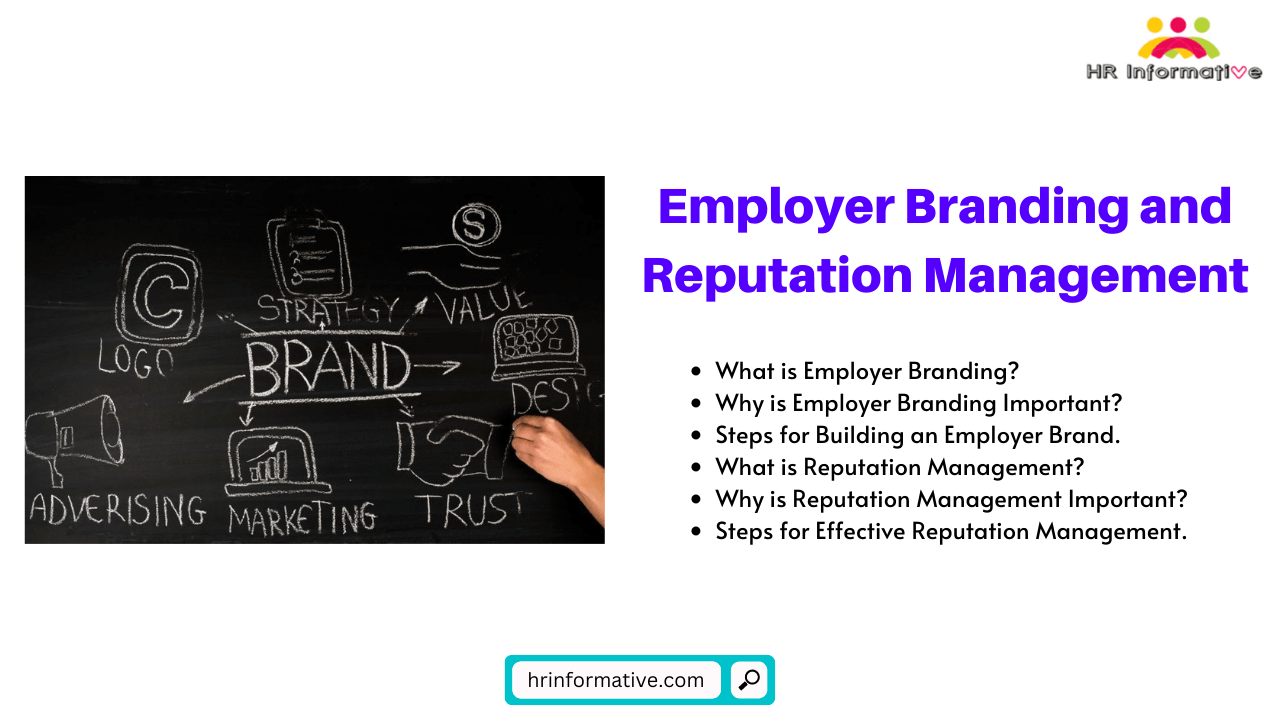In today’s highly competitive job market, employer branding and reputation management have become critical for organizations. Employers have realized the importance of building and maintaining a positive image to attract and retain top talent. This article will discuss the importance of employer branding and reputation management, how to build an employer brand and the impact of a positive employer brand on recruitment and retention.
What is Employer Branding?
Employer branding refers to the process of creating and promoting a company’s image as an employer. It involves a company’s efforts to position itself as an attractive place to work by showcasing its values, culture, and mission. A strong employer brand can help organizations attract and retain top talent, enhance employee engagement, and improve overall business performance.
Why is Employer Branding Important?
A positive employer brand can help an organization in several ways. Firstly, it can attract high-quality candidates who are more likely to fit into the company’s culture and values. Secondly, it can help retain employees who feel proud to be associated with the company and its mission. Thirdly, it can enhance the company’s reputation in the market, which can lead to increased business opportunities.
Steps for Building an Employer Brand
Building an employer brand requires a deliberate and strategic approach. Here are some steps that organizations can take to build a strong employer brand:
1. Define Your Employer Value Proposition (EVP)
An EVP is a set of unique attributes and benefits that make an organization an attractive place to work. It is the foundation of employer branding, and organizations must have a clear and compelling EVP to attract and retain top talent. An EVP should reflect the company’s culture, values, and mission.
2. Assess Your Current Employer Brand
Before building an employer brand, it’s important to understand the organization’s current brand perception. Conducting an internal and external assessment can help organizations identify areas of strength and weakness. This can include employee surveys, focus groups, and external reviews on websites like Glassdoor.
3. Develop Your Employer Branding Strategy
Once an organization has a clear understanding of its current employer brand, it can develop a strategy to enhance it. This can include creating an employee value proposition, identifying key messages, and developing a communication plan.
4. Implement Your Employer Branding Strategy
Once an employer branding strategy has been developed, it’s important to implement it consistently across all touchpoints. This can include the company website, social media, job descriptions, and recruitment materials.
5. Measure and Monitor Your Employer Brand
To ensure that an employer brand is effective, it’s important to measure and monitor it regularly. This can include tracking employee engagement, turnover rates, and candidate feedback. It’s also important to monitor online reviews and respond promptly to any negative feedback.
Impact of a Positive Employer Brand on Recruitment and Retention
A positive employer brand can have a significant impact on recruitment and retention. Here are some benefits of a positive employer brand:
1. Attract High-Quality Candidates
A positive employer brand can attract high-quality candidates who are more likely to fit into the company’s culture and values. It can also help attract passive candidates who are not actively looking for new opportunities but may be interested in joining a company with a strong employer brand.
2. Improve Candidate Experience
A positive employer brand can also improve the candidate experience. Candidates are more likely to have a positive experience if they feel that the organization values them and their time. This can lead to better candidate engagement and a higher likelihood of accepting job offers.
3. Enhance Employee Engagement
A positive employer brand can also enhance employee engagement. Employees who feel proud to be associated with the company and its mission are more likely to be engaged and motivated. This can lead to improved productivity, higher job satisfaction, and lower turnover rates.
4. Increase Retention
A positive employer brand can also increase retention rates. When employees feel valued and connected to their organization, they are more likely to stay long-term. This can save organizations time and money on recruitment and training costs.
5. Boost Business Performance
A positive employer brand can also have a positive impact on business performance. When organizations attract and retain top talent, they are more likely to have a high-performing workforce. This can lead to increased innovation, better customer service, and higher profitability.
What is Reputation Management?
Reputation management is the process of monitoring and influencing how an organization is perceived by its stakeholders. This includes customers, employees, investors, and the public at large. A positive reputation can enhance an organization’s brand and increase its business opportunities, while a negative reputation can damage its brand and lead to lost business.
Why is Reputation Management Important?
In today’s digital age, reputation management has become increasingly important. With the rise of social media and online review platforms, organizations can be easily scrutinized by the public. Negative reviews or comments can quickly go viral and damage an organization’s reputation. Therefore, it’s important for organizations to actively manage their reputation to minimize negative feedback and promote positive feedback.
Steps for Effective Reputation Management
Here are some steps that organizations can take to effectively manage their reputation:
1. Monitor Your Reputation
Organizations should regularly monitor their online reputation. This can include monitoring social media platforms, review websites, and search engine results. Monitoring can help organizations quickly identify negative feedback and respond in a timely manner.
2. Respond Promptly to Negative Feedback
When negative feedback is identified, organizations should respond promptly and professionally. This can include addressing the issue publicly and offering a solution to the problem. Responding promptly can show stakeholders that the organization values their feedback and is committed to resolving any issues.
3. Promote Positive Feedback
Organizations should also actively promote positive feedback. This can include highlighting positive reviews and testimonials on the company website and social media platforms. Promoting positive feedback can enhance the organization’s reputation and increase its credibility with stakeholders.
4. Build Relationships with Stakeholders
Building strong relationships with stakeholders can also enhance an organization’s reputation. This can include engaging with customers on social media, providing excellent customer service, and supporting local community initiatives. Building strong relationships can increase stakeholder loyalty and improve overall brand perception.
5. Maintain Ethical Practices
Maintaining ethical practices is also critical for reputation management. Organizations should conduct themselves with integrity and transparency to build trust with stakeholders. This can include adhering to ethical business practices, following industry regulations, and being transparent about any issues that may arise.
Conclusion
In today’s competitive job market, employer branding and reputation management have become critical for organizations. Building a strong employer brand can help attract and retain top talent, enhance employee engagement, and improve overall business performance. Reputation management can also enhance an organization’s brand and increase its business opportunities. By taking a deliberate and strategic approach to employer branding and reputation management, organizations can position themselves as attractive places to work and do business with.
FAQs
Q: What is employer branding?
Ans: Employer branding is the process of shaping the perceptions of an organization as an employer among current and potential employees. It involves creating a positive image of the organization as a great place to work, with strong values, a supportive culture, and attractive benefits.
Q: Why is employer branding important?
Ans: Employer branding is important because it can help organizations attract and retain top talent, improve employee engagement and productivity, and enhance overall business performance. A strong employer brand can also improve a company’s reputation and increase its business opportunities.
Q: What are some key elements of employer branding?
Ans: Key elements of employer branding include the company’s mission and values, its culture and work environment, employee benefits and perks, opportunities for career growth and development, and its reputation as an employer.
Q: What is reputation management?
Ans: Reputation management is the process of monitoring and influencing how an organization is perceived by its stakeholders. It involves actively managing the organization’s image and responding to negative feedback or comments in a timely and professional manner.
Q: Why is reputation management important?
Ans: Reputation management is important because a positive reputation can enhance an organization’s brand and increase its business opportunities, while a negative reputation can damage its brand and lead to lost business. In today’s digital age, with the rise of social media and online review platforms, reputation management has become increasingly important.
Q: What are some steps for effective reputation management?
Ans: Some steps for effective reputation management include regularly monitoring the organization’s online reputation, responding promptly and professionally to negative feedback, promoting positive feedback, building strong relationships with stakeholders, and maintaining ethical practices.
Q: How can organizations measure the success of their employer branding and reputation management efforts?
Ans: Organizations can measure the success of their employer branding and reputation management efforts by tracking metrics such as employee retention rates, employee engagement scores, customer satisfaction ratings, and online review ratings. They can also conduct surveys and focus groups to gather feedback from stakeholders.
Related Posts :




